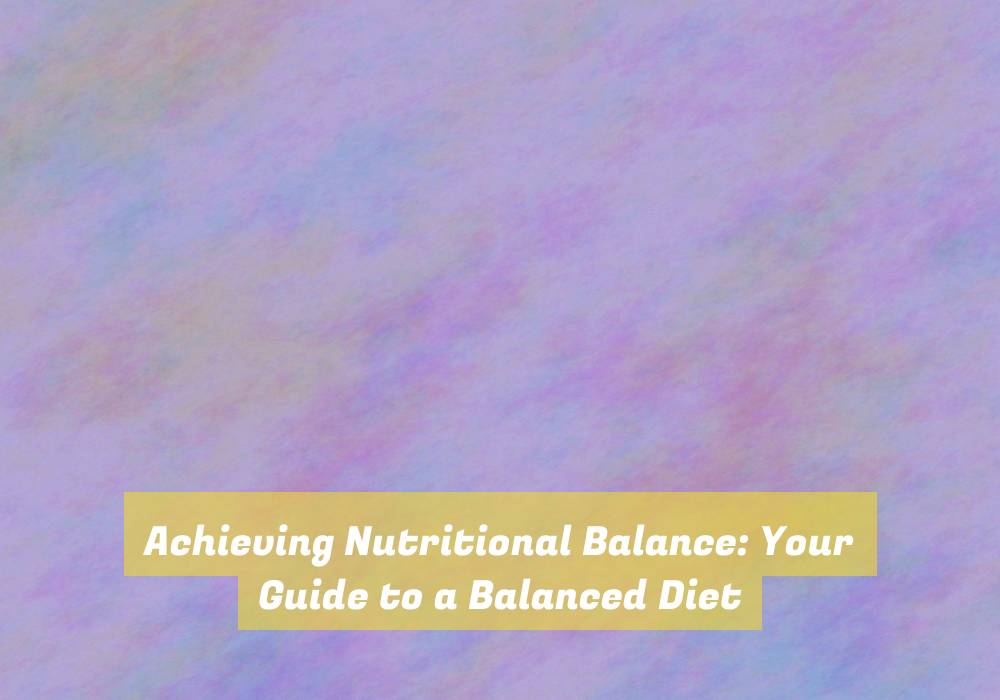Achieving Nutritional Balance: Your Guide to a Balanced Diet
Embarking on the journey to achieving a balanced diet is like navigating a complex puzzle – with various pieces that need to fit together just right. But fear not, for with the right guidance, you can unravel the mystery of nutritional balance and pave the way to a healthier you.
As you explore the intricacies of this intricate puzzle, youG??ll uncover the essential components that make up a well-rounded diet, and how each piece plays a crucial role in supporting your overall health and well-being.
So, letG??s unravel the puzzle together and discover the keys to achieving nutritional balance.
Understanding Balanced Nutrition
Understanding balanced nutrition is essential for maintaining a healthy lifestyle and meeting your bodyG??s needs. It involves consuming a variety of foods in appropriate portions to provide essential nutrients such as carbohydrates, proteins, fats, vitamins, and minerals.
By understanding the role of these nutrients, you can make informed choices about your diet. Carbohydrates are your bodyG??s primary source of energy, while proteins are essential for building and repairing tissues. Fats are important for energy, nutrient absorption, and protecting your organs. Vitamins and minerals play a crucial role in various bodily functions, from maintaining healthy bones to supporting your immune system.
Additionally, understanding the importance of hydration is vital for overall well-being. By being mindful of your fluid intake, you can support your bodyG??s processes and maintain optimal health.
Essential Nutrients for Health
To maintain a balanced diet and support your overall well-being, itG??s vital to understand the essential nutrients necessary for health. These nutrients are crucial for your body to function optimally and to prevent deficiencies that can lead to various health issues.
The key essential nutrients for health include carbohydrates, proteins, fats, vitamins, minerals, and water.
Carbohydrates are your bodyG??s primary source of energy and are found in foods like fruits, vegetables, whole grains, and legumes.
Proteins are essential for building and repairing tissues, and can be obtained from sources such as lean meats, poultry, fish, eggs, dairy, and plant-based sources like beans and nuts.
Fats are necessary for absorbing certain vitamins and for providing energy. Healthy fat sources include avocados, nuts, seeds, and olive oil.
Vitamins and minerals are also vital for maintaining good health. They play various roles in the body, such as supporting immune function, aiding in metabolism, and promoting healthy skin and eyes.
Finally, water is essential for hydration, digestion, and regulating body temperature.
Ensuring that your diet includes adequate amounts of these essential nutrients is crucial for promoting overall health and well-being.
Incorporating Diverse Food Groups
Incorporate a variety of food groups into your meals to ensure you receive a wide range of essential nutrients for optimal health and well-being. Aim to include fruits, vegetables, whole grains, lean proteins, and healthy fats in your daily diet.
Each food group offers unique nutrients that your body needs to function at its best. Fruits and vegetables provide essential vitamins, minerals, and fiber, while whole grains offer complex carbohydrates and additional fiber. Lean proteins, such as poultry, fish, beans, and nuts, are rich in protein, iron, and other important nutrients.
Healthy fats, found in foods like avocados, nuts, and olive oil, are crucial for heart health and overall well-being. By incorporating diverse food groups into your meals, you can ensure that youG??re getting a wide range of nutrients, which can help prevent deficiencies and support your overall health.
Remember to prioritize variety and moderation, as no single food or food group can provide all the nutrients your body needs.
Strategies for Long-Term Healthy Eating
For sustained healthy eating habits, focus on developing a balanced and varied meal plan that includes a diverse range of nutrient-rich foods.
Start by setting achievable goals, such as incorporating more vegetables into your meals or trying out new healthy recipes each week.
Planning your meals in advance can also help you stay on track. Take time to create a weekly menu and shopping list, ensuring that you have the necessary ingredients for balanced meals.
Additionally, aim to cook at home more often, as this gives you better control over the ingredients and cooking methods. When dining out, look for restaurants that offer healthier options or customizable dishes.
Another important strategy is to practice mindful eating. Pay attention to your bodyG??s hunger and fullness cues, and savor each bite without distractions.
Lastly, staying consistent with your efforts and being patient with yourself is key. Remember that healthy eating is a long-term journey, and small, sustainable changes can lead to lasting results.
Conclusion
You now have the knowledge and tools to achieve a balanced diet and maintain long-term healthy eating habits. By understanding the importance of essential nutrients, incorporating diverse food groups, and implementing strategies for balanced nutrition, you can take control of your health and well-being.
Remember to make small, sustainable changes and listen to your bodyG??s needs. With dedication and consistency, you can achieve nutritional balance and enjoy a healthier, happier life.






What a fantastic way to frame the concept of balanced nutrition! The puzzle analogy resonates with me, as I’ve often found myself searching for those elusive pieces—trying to understand how protein, fats, and carbs work together rather than in isolation. It’s interesting to consider how our diets not only affect our health but also reflect our lifestyles and cultural backgrounds.
I completely relate to your experience with the puzzle analogy when it comes to balanced nutrition. It really does feel like a journey of discovery, doesn’t it? Each piece—protein, fats, and carbs—fits together in a unique way that contributes to our overall health and energy levels. I’ve found that understanding how these macronutrients interact has not only helped me feel better physically but also made me more mindful of my food choices in relation to my lifestyle.
It’s great to hear that you’re finding value in the puzzle analogy. It really is fascinating how each macronutrient has its own role, almost like individual players on a team, working together to keep us at our best. When we start connecting those pieces, it’s not just about nutrition; it becomes a deeper understanding of how what we eat affects our mood and energy levels.
It’s great to hear that the puzzle analogy resonated with you. I think there’s something quite fascinating about how each piece of balanced nutrition really does tell its own story, doesn’t it? It’s like you’re gradually piecing together a picture of what works best for your body and lifestyle.
It’s interesting to hear how you connect with the puzzle analogy when thinking about balanced nutrition. The way each macronutrient—proteins, fats, and carbohydrates—acts as its own piece really does contribute to a larger picture of well-being. It’s all about finding that balance and understanding how each component interacts with our body’s needs.